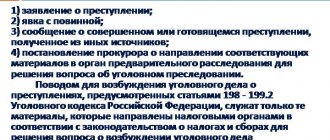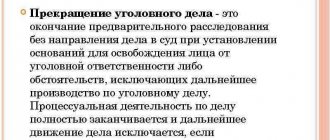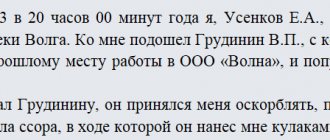1. If there is a reason and grounds provided for in Article 140 of this Code, the body of inquiry, the inquirer, the head of the investigative body, the investigator, within the competence established by this Code, initiate a criminal case, about which a corresponding resolution is issued.
2. The decision to initiate a criminal case shall indicate: 1) the date, time and place of its issuance; 2) by whom it was issued; 3) the reason and basis for initiating a criminal case; 4) paragraph, part, article of the Criminal Code of the Russian Federation, on the basis of which a criminal case is initiated.
3. If a criminal case is sent to the prosecutor to determine jurisdiction, then a corresponding note is made about this in the decision to initiate a criminal case.
4. A copy of the resolution of the head of the investigative body, investigator, inquirer on the initiation of a criminal case is immediately sent to the prosecutor. When a criminal case is initiated by captains of sea or river vessels on long voyages, heads of geological exploration parties or wintering quarters, heads of Russian Antarctic stations or seasonal field bases remote from the locations of the investigative bodies, heads of diplomatic missions or consular offices of the Russian Federation, the prosecutor is immediately notified specified persons about the commenced investigation. In this case, the decision to initiate a criminal case is transferred to the prosecutor immediately when a real opportunity arises. If the prosecutor recognizes the decision to initiate a criminal case as illegal or unfounded, he has the right, no later than 24 hours from the moment of receipt of the materials that served as the basis for initiating a criminal case, to cancel the decision to initiate a criminal case, about which he issues a reasoned decision, a copy of which immediately forwards it to the official who initiated the criminal case. The head of the investigative body, the investigator, the inquiry officer shall immediately notify the applicant, as well as the person against whom the criminal case has been initiated, about the decision made.
5. Criminal cases against persons specified in Article 447 of this Code are initiated in the manner established by Article 448 of this Code.
Everything about criminal cases
Go to the text of the Code of Criminal Procedure
Url Additional information:
Criminal proceedings
— Part 1 146 Code of Criminal Procedure
decision to initiate criminal proceedings
— Part 1 146 Code of Criminal Procedure
bodies authorized to initiate criminal proceedings
— Part 1 146 Code of Criminal Procedure
initiation of a case if there are reasons and grounds
— Part 1 146 Code of Criminal Procedure
issuing a decision to initiate a case
Contents of the decision to initiate a case
- Part 2 146 Code of Criminal Procedure
The decision to initiate the case states:
— clause 1 part 2 146 Code of Criminal Procedure
time and place of delivery
— clause 2, part 2, 146 Code of Criminal Procedure
who issued it
— clause 3, part 2, 146 Code of Criminal Procedure
reason and grounds for initiating a case
- clause 4 part 2 146 Code of Criminal Procedure
Article of the Criminal Code (legal assessment of the act)
- Part 3 146 Code of Criminal Procedure
mark if to the prosecutor to determine jurisdiction
Copy to the prosecutor
- Part 4 146 Code of Criminal Procedure
copy of the decision to initiate a case to the prosecutor
- Part 4 146 Code of Criminal Procedure
the prosecutor can cancel the initiation of the case within 24 hours
Notice of initiation
- Part 4 146 Code of Criminal Procedure
the applicant and the suspect are notified of the initiation of the case
Special subjects
- Part 5 146 Code of Criminal Procedure
for special subjects the procedure for initiation is special (
448 Code of Criminal Procedure
)
How the case is initiated
Excitation order
criminal case, selection of practical materials
Resolution on initiation
Resolution on initiation
criminal case: aspects useful for defense
Article 146 of the Code of Criminal Procedure. Initiation of a criminal case of public prosecution
1) If there are reasons and grounds provided for in 140 Code of Criminal Procedure, the body of inquiry, the inquiry officer, the investigator, the head of the investigative body
Url Additional information:
Appeal against the initiation of a case
— clause 2
Plenum No. 1 appeal against a specific person
a criminal case is initiated, and a corresponding resolution is issued.
Url Additional information:
Useful information in the resolution
Contents of the resolution
: what useful information can be found there?
2) The decision to initiate a criminal case shall indicate:
Url Additional information:
Beginning of the investigation period
Start of counting
terms of investigation in the decision to initiate a case
1). date, time and place of its issuance;
2). by whom it was issued;
3). the reason and basis for initiating a criminal case;
Url Additional information:
Initial qualification
Initial qualification
acts in the resolution to initiate proceedings
Set of crimes
(necessity of regulation)
When combined
crimes must be initiated for each episode
Qualification when excited
Qualification when excited
case, initial (
clause 4, part 2, 146 Code of Criminal Procedure
)
4). clause, part, article of the Criminal Code on the basis of which a criminal case is initiated.
Url Additional information:
- Part 7 151 Code of Criminal Procedure
when merging cases, jurisdiction is determined by the prosecutor
3) If a criminal case is sent to the prosecutor to determine jurisdiction, then a corresponding note is made about this in the decision to initiate a criminal case.
4) A copy of the resolution of the head of the investigative body, investigator, inquirer on the initiation of a criminal case is immediately sent to the prosecutor. When a criminal case is initiated by captains of sea or river vessels on long voyages, heads of geological exploration parties or wintering camps, heads of Russian Antarctic stations or seasonal field bases remote from the locations of investigative bodies, heads of diplomatic missions or consular offices, the prosecutor is immediately notified by these persons about the ongoing investigation. In this case, the decision to initiate a criminal case is transferred to the prosecutor immediately when a real opportunity arises.
If the prosecutor recognizes the decision to initiate a criminal case as illegal or unfounded:
- he has the right, no later than 24 hours from the moment of receipt of the materials that served as the basis for initiating a criminal case, to cancel
the decision to initiate a criminal case,
about which he issues a reasoned decision, a copy of which is immediately sent to the official who initiated the criminal case.
Url Additional information:
Copies of the resolution
Copies of the resolution
sent to the victim and suspect
The head of the investigative body, the investigator, the interrogating officer shall immediately notify the following about the decision made:
Url Additional information:
— clause 13, part 2, 42 Code of Criminal Procedure
the right of the victim to receive copies of documents
- the applicant,
Url Additional information:
- clause 1 part 4 46 Code of Criminal Procedure
the suspect's right to a decision to initiate a case
- as well as the person against whom a criminal case has been initiated.
Url Additional information:
— paragraph 29
Plenum No. 17 filing an application to the magistrates' court for special subjects
5) Criminal cases against persons specified in Article 447 of the Code of Criminal Procedure are initiated in the manner prescribed by Article 448 of the Code of Criminal Procedure.
Return to the text of the Code of Criminal Procedure
Seek advice
Article 146. Initiation of a criminal case of public prosecution
Article 146. Initiation of a criminal case of public prosecution
[Code of Criminal Procedure] [Part Two] [Section VII] [Chapter 20]
. If there is a reason and grounds provided for in Article 140 of this Code, the body of inquiry, the inquirer, the head of the investigative body, the investigator, within the competence established by this Code, initiate a criminal case, about which a corresponding resolution is issued.
. The decision to initiate a criminal case shall indicate:
- 1) date, time and place of its adoption;
- 2) by whom it was issued;
- 3) the reason and basis for initiating a criminal case;
- 4) paragraph, part, article of the Criminal Code of the Russian Federation, on the basis of which a criminal case is initiated.
. If a criminal case is sent to the prosecutor to determine jurisdiction, then a corresponding note is made about this in the decision to initiate a criminal case.
. A copy of the resolution of the head of the investigative body, investigator, or inquiry officer to initiate a criminal case is immediately sent to the prosecutor. When a criminal case is initiated by captains of sea or river vessels on long voyages, heads of geological exploration parties or wintering quarters, heads of Russian Antarctic stations or seasonal field bases remote from the locations of the investigative bodies, heads of diplomatic missions or consular offices of the Russian Federation, the prosecutor is immediately notified specified persons about the commenced investigation. In this case, the decision to initiate a criminal case is transferred to the prosecutor immediately when a real opportunity arises. If the prosecutor recognizes the decision to initiate a criminal case as illegal or unfounded, he has the right, no later than 24 hours from the moment of receipt of the materials that served as the basis for initiating a criminal case, to cancel the decision to initiate a criminal case, about which he issues a reasoned decision, a copy of which immediately forwards it to the official who initiated the criminal case. The head of the investigative body, the investigator, the inquiry officer shall immediately notify the applicant, as well as the person against whom the criminal case has been initiated, about the decision made.
. Criminal cases against persons specified in Article 447 of this Code are initiated in the manner established by Article 448 of this Code.
Commentary on Article 146 of the Code of Criminal Procedure of the Russian Federation
1. The commented article provides for the procedure for initiating a public prosecution case. The act of initiating a criminal case begins public criminal prosecution on behalf of the state in connection with the committed criminal act <1>, carried out by the investigator, the inquiry body and the interrogating officer. The court, as a body independent of the prosecution, does not have the right to initiate cases of public prosecution. Having established in the course of legal proceedings the signs of a socially dangerous act, the court has the right to make a private ruling on this (Part 4 of Article 29 of the Code of Criminal Procedure) and send the material to the prosecutor (head of the investigation department) to resolve the issue of initiating a criminal case (for example, if it is established that the testimony of a witness is deliberately false ). The procedure for initiating private prosecution cases is established by Art. 318.
——————————— <1> See: Resolution of the Constitutional Court of the Russian Federation of January 14, 2000 N 1-P “In the case of verifying the constitutionality of certain provisions of the Code of Criminal Procedure of the RSFSR, regulating the powers of the court to initiate criminal proceedings, in connection with complaint of gr. I.P. Smirnova and the request of the Supreme Court of the Russian Federation” // RG. 2000. February 2. N 23.
2. The right to initiate a criminal case is vested in the body of inquiry, the investigator, the head of the inquiry unit, the investigator and the head of the investigation. In this case, on behalf of the inquiry body, the resolution is drawn up by an official of the inquiry body. Such a resolution requires approval by the head of the inquiry body. On the contrary, the decision of the inquiry officer does not require the approval of the head of the inquiry body.
3. If a criminal case is initiated against a person, then the resolution additionally indicates evidence of the person’s involvement in the commission of a crime, his last name, first name and patronymic. The name of the suspect must be indicated in the decision to initiate a case when he is presumably identified, i.e. there is evidence of his participation in the commission of a crime, for example, in a statement about a crime there is an indication of a specific criminal. Otherwise, the case may be initiated after the fact in order to limit the suspect's right to defense. In the decision to initiate a case, the paragraph, part, article of the Criminal Code (the result of qualifying the act) are indicated as precisely as possible in the conditions of lack of information at the stage of initiating the case. It is unacceptable to qualify an act “with reserve” - as a more serious crime than it follows from the established characteristics. Overqualification can lead to the unreasonable use of procedural coercive measures and to an incorrect determination of generic jurisdiction (see com. to Article 151). The classification of the crime specified in the resolution to initiate the case is of a preliminary nature and can be changed to another when brought as an accused (see com. to Art. 171).
4. Part 3 com. Articles taking into account clause 2, part 2, art. 38 in ed. Federal Law No. 87-FZ dated 06/05/2007 suffers from incompleteness. To determine jurisdiction, a criminal case is sent by the investigator and the inquiry body to the prosecutor, and by the investigator to the head of the investigation department. If a dispute arises about jurisdiction, it is resolved by the prosecutor (Part 8 of Article 151).
5. When checking the legality and validity of the decision to initiate a criminal case, the prosecutor is authorized to study all materials of the preliminary verification of reports of crimes.
6. It seems that a 24-hour time limit for the prosecutor to cancel a decision to initiate a criminal case issued against a specific person cannot be justified by the need to ensure the stability of the preliminary investigation, since until its completion such a decision may be recognized as illegal and unfounded by the court. complaint of interested parties in accordance with Art. 125 Code of Criminal Procedure. For more information about this, see com. to part 2 art. 145. In this regard, it can be considered possible to use the analogy of paragraph 1.12 of Order of the Prosecutor General’s Office of the Russian Federation dated 06/02/2011 N 162 “On the organization of prosecutorial supervision over the procedural activities of preliminary investigation bodies”, according to which a higher prosecutor has the right to cancel the decision to initiate a criminal case in the manner , provided for in part 4 com. article, in case of disagreement with the decision of the lower prosecutor to recognize this resolution as legal.
Literally com. norms, the beginning of the calculation of this period is the receipt by the prosecutor not of a copy of the decision to initiate a case, but of materials. This means that, having received a copy of the decision, the prosecutor requests materials substantiating it, from the moment of receipt of which the 24-hour period begins to run (see paragraph 1.4 of the above Order).
In accordance with paragraph 5 of Part 2 of Art. 38 of the Code of Criminal Procedure, the investigator has the right to appeal with the consent of the head of the investigation in the manner prescribed by Part 4 of Art. 221 of the Code of Criminal Procedure, the prosecutor’s decision to cancel the decision to initiate a criminal case.
7. The prosecutor’s decision to cancel the decision to initiate a case is not listed among the grounds for terminating future criminal prosecution against specific individuals on the same suspicion (clause 5, part 1, article 27 of the Code of Criminal Procedure). However, re-initiation of a criminal case on the same fact and against the same persons is possible if there are additional grounds (for about them, see part 2 of Article 140). This decision can be appealed to a higher prosecutor, and by potential victims or civil plaintiffs - to court.
8. The Criminal Procedure Law provides for a special procedure for initiating criminal proceedings upon requests from foreign states for criminal prosecution (see com. to Article 459) and in relation to persons with official immunity (see com. to Article 448).
9. In judicial and investigative practice, the question arises: is it necessary to initiate a criminal case when, during the preliminary investigation, new episodes of criminal activity or new persons involved in the commission of crimes are identified? The Supreme Court of the Russian Federation in a number of its decisions indicated that the procedural law does not provide for the obligation of the preliminary investigation authorities to issue each time a new resolution to initiate a criminal case in cases where it is established in the case that another person is involved in the crime committed, or it is established that another person has committed other crimes , against whom a criminal case has been initiated <1>. However, the Constitutional Court of the Russian Federation took a slightly different position <2>, noting that the criminal procedure law does not contain rules allowing to bring a person as a suspect or accused, as well as to change and supplement a previously brought charge in connection with the commission of a crime by a person, on the basis of which criminal no case was initiated. On the contrary, the Code of Criminal Procedure presupposes the need to comply with the general provisions of its articles 140, 146 and 153, by virtue of which, if there is sufficient data indicating signs of a crime, a decision must be made to initiate a criminal case, which, in the presence of other criminal cases about crimes committed by the same person can be combined with them in one production. At the same time, the Constitutional Court of the Russian Federation indicated that it is within the competence of law enforcement agencies to determine whether a newly discovered criminal act is an integral part of crimes for which a criminal case has already been initiated, or whether it forms an independent crime, on the basis of which a new criminal case should be initiated . It seems that in order to resolve the issue of the identity or difference of acts, it is necessary to take into account their localization in space and time, the commonality of the generic object of the assault, the circle of victims who insist on separate consideration of their statements about the commission of crimes.
——————————— <1> See: Determination of the RF Armed Forces dated November 25, 1998 // BVS RF. 2000. N 3; Cassation ruling of the Military Collegium of the Armed Forces of the Russian Federation dated January 20, 2004 in case No. 6-073/03; Cassation ruling of the Judicial Collegium for Criminal Cases of the Armed Forces of the Russian Federation dated September 25, 2006 in case No. 14-o06-29. <2> See: Definitions of the Constitutional Court of the Russian Federation dated July 18, 2006 N 343-O and dated December 21, 2006 N 533-O.
In what situations is it necessary to use the mechanism of joining criminal cases, i.e. first initiate new criminal cases, and then combine them in one proceeding, and in what cases is it possible, without initiating new criminal cases, to immediately include new crimes in the content of the charge? It seems that the answer to this question cannot be unambiguous. In our opinion, the unity of a criminal case is determined by the indivisibility of its subject in time, space, by persons, as well as by the object or objective side of the crimes, and, conversely, the divisibility of the subject according to the above criteria can lead to a multiplicity of cases brought. The main subject of a criminal case is the issue of criminal liability, subject to resolution by the preliminary investigation body or the court in a specific life situation. If this subject is indivisible, then the emergence of information about other crimes committed by the suspect (accused), or other persons suspected of committing a crime in complicity with him, should not lead to the initiation of new criminal cases. In this case, the divisibility or indivisibility of the subject of a criminal case is determined by the interests of maintaining legal certainty, as well as protecting the legitimate interests of the suspect, accused or victim.
The indivisibility of the subject of a criminal case in time can only occur until the end of the preliminary investigation. If a decision was made to terminate the criminal case or it was sent to court for consideration on the merits, then when information appears about other, previously unknown crimes committed by the same person, or the participation of other persons in the commission of a crime, the indivisibility of the subject of the criminal case under the temporary there is no longer any need to speak to the criterion, and therefore new cases must be brought.
Indivisibility of the subject of a criminal case in space, i.e. the initiation of a case and the conduct of pre-trial preparation on this issue of criminal liability by one preliminary investigation body is determined by compliance with the rules of jurisdiction. Thus, if data appears about the commission of new crimes by the same suspect or accused or about the participation of other persons in the commission of this crime, but all these crimes fall under the jurisdiction of the same preliminary investigation body that has already opened a criminal case, then the initiation of new cases (based only on this criterion) are not required. However, when such new data is identified by other law enforcement agencies on the grounds of a different territorial, as well as subject or personal jurisdiction belonging to these bodies, then in the interests of maintaining legal certainty, these bodies, within their competence, must initiate new criminal cases, which can later be transferred to connections in one production.
The indivisibility of the subject of a criminal case by persons (personal criterion) means that the subject composition of the legal relationship that emerged at the stage of the preliminary investigation on the issue of criminal liability does not change significantly. For example, it turns out that a person against whom a criminal case has already been initiated on the grounds of one crime has committed one or more other similar crimes, and in relation to the same victim. If we proceed only from this criterion, then the initiation of new criminal cases in this situation seems unnecessary. If information is received indicating that this person has committed other crimes against new persons, then the issue of initiating new criminal cases must be decided. Otherwise, in the event of a refusal to initiate a case, or if charges are not brought against new episodes of criminal activity, new victims will not be able to exercise their right to appeal decisions to refuse to initiate cases or the inaction of the investigator, which will violate the principle of equality of all before the law, as well as the right of these victims to judicial protection (Articles 19, 52 of the Constitution of the Russian Federation). It is also necessary, in our opinion, every time, based on this criterion, to initiate criminal cases against new participants in the crime, if the case was previously initiated not simply upon the discovery of an event with signs of a crime (in rem, lat.), but against a specific person ( in person). Indeed, a participant in the act under investigation, against whom no case was brought and who, therefore, was not notified of the nature of the suspicion, will be placed in a significantly worse position compared to a person who was recognized as a suspect, was notified of the initiation of a criminal case against him, and therefore timely informed about the nature of the suspicion (part 4 of article 146 of the Code of Criminal Procedure of the Russian Federation). But this is not consistent with the principle of equality of all before the law and violates the right to protection of the person against whom criminal prosecution actions (interrogations, searches, etc.) are actually carried out (albeit without an official decision).
Thus, the provision contained in Part 1 of Art. 448 cannot be considered justified to the extent that it allows a person to be brought in as an accused without first initiating a case against him, if it has already been instituted against another person. This norm can hardly be considered special and has priority in relation to the more general rule for these conditions, enshrined in Part 1 of Art. 144 of the Code of Criminal Procedure of the Russian Federation, because it unreasonably detracts from the legitimate interests of persons who, on the contrary, should have additional procedural guarantees from criminal prosecution. However, in cases where a criminal case has not been initiated against a specific person, but only on the fact of committing a crime, within the limits of the criterion under consideration, the initiation of new cases against new participants in the act is not required, because in this case it cannot be argued that the subject composition of the legal relationship regarding criminal liability changes .
In addition, the indivisibility of the subject of a criminal case according to the object or objective side of the crimes will occur when the generic or direct object of the crime in respect of which a criminal case was initiated is the same or partially coincides with the object of the crime identified later, or the objective side of both crimes in their main features are similar or overlap. In such cases (of course, provided that other indivisibility criteria are met), there is no need to initiate a new criminal case, because the right to defend the suspect or accused does not suffer significant damage.






